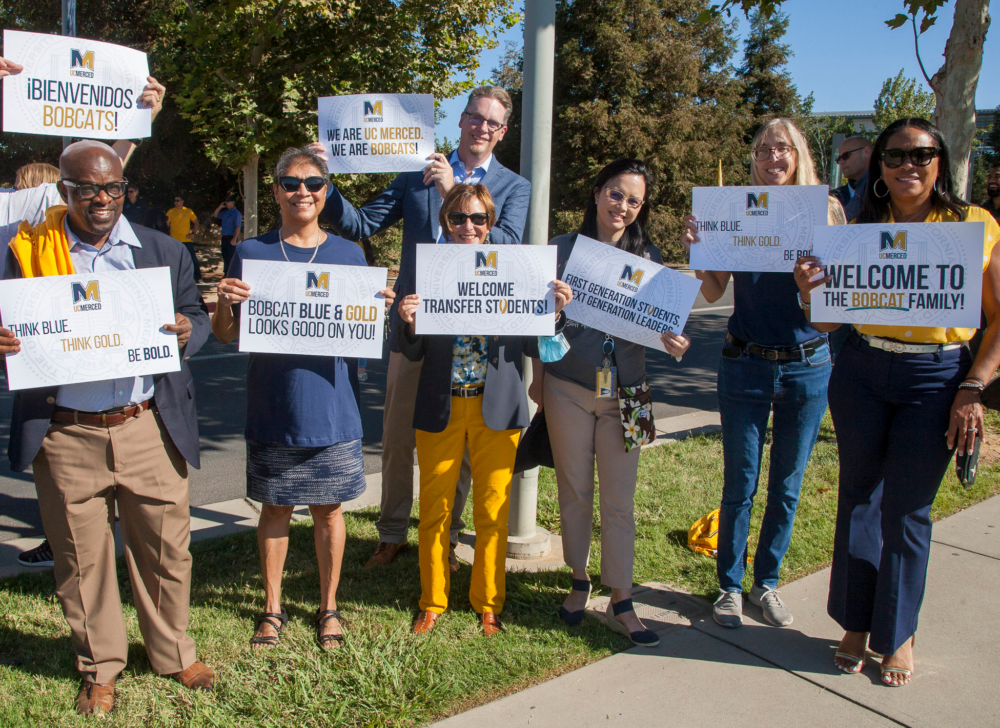Nick Dugan shared with the UC IT Blog team the diversity statement he submitted as part of his application for the position of Vice Chancellor and Chief Information Officer at UC Merced.
By Nick Dugan. My understanding of and commitment to the principles of diversity, equity, and inclusion were forged through a series of early personal experiences that I have carried with me throughout my adulthood. As the oldest of three children raised by a single parent, I watched my mother struggle with inequity, misogyny, and outright discrimination in the workplace – the result of which directly impacted her earning potential and our quality of life for decades. Watching this transpire made an indelible impact on my life; a powerful and ever-present motivator to learn from, work for, and lead an organization that will not tolerate such inequity and bias, and actively works against it. As a result, I have built my career on a people-first philosophy of empathy, integrity, and commitment to addressing institutional and systemic inequities.
As a cisgender white man in an institution that serves a population which by and large does not look like me nor have my background and experience, I view my leadership role as one of creating and fostering an environment for other voices to shine through. In the Central Valley we are fortunate to pull from a talent pool rich with diversity; in the Office of Information Technology approximately one third of our staff are women and more than half are people of color. This is an easy place to create “checkbox diversity” – but it has been my experience that without the culture, language, and connection necessary to navigate that diversity, the benefits are not realized. This work is ongoing, requiring a cycle of continuous improvement and feedback, and acknowledgement that there is always more to do.
As Deputy CIO I have led several efforts to foster an inclusive environment, including large-scale professional development efforts, promotion and recognition for staff members active in building a Diversity, Equity, and Inclusive (DEI) culture, and a focus on digital equity. In 2019 I led a year-long professional development program for OIT’s (Office of Information Technology) extended leadership team centered on the themes of empathy and bias, exploring the concepts in three frames – among ourselves as a leadership team, as leaders of our own teams, and with the clients that we serve across campus. This program culminated in a day-long retreat with an invited guest speaker for a deep dive into the topic of implicit bias, with a particular focus on gender in the workplace. In retrospect, the opportunity for our leaders to explore complex topics like personal bias in a trusting space has laid an important foundation to continue building on as we weave these principles into the fabric of our organization. This has empowered our leaders to find their own voice – OIT is fortunate to have several employees who are active in the promotion of women in IT, contributing to various higher education workgroups and mentorship programs. This year I successfully nominated one such individual for a Staff Excellence Award and have worked to promote similar efforts across campus through news articles and recognition via STAR awards.
For the past year I have participated in a UC workgroup to author a Digital Inclusion Guidance Framework that seeks to codify the lessons learned from the Covid-19 pandemic and provide a set of best practices for campuses moving forward. Recommendations range from campus infrastructure to digital inclusion in teaching and learning, making sure our most vulnerable populations are not left behind by shifting learning modalities and the reality of faculty/student interactions increasingly happening online. This is especially important to the student demographic that UC Merced serves, and a critical role for IT leadership to play in campus-wide DEI objectives.
At my direction, OIT recently completed a review of our entire web presence and documentation library, seeking to identify and eliminate biased or problematic terms from our digital resources and everyday vernacular. Following an excellent guide published by colleagues across the UC system, we were able to replace numerous examples of problematic IT terms with more inclusive language. This is one part of a broader effort in OIT to be sensitive and responsive to the community we serve, and to make sure our presence on campus is as inclusive and representative as possible. OIT makes a conscious effort to highlight our student employees in our outreach and engagement efforts and works hard to ensure that the products we produce (for example, the “OIT Behind the Scenes” webinar series from 2021 and 2022) feature a diverse range of individuals that mirrors our organization and the campus at large.
As an institutional leader, I view recruitment and retention of staff to be one of my most critical responsibilities. IT organizations often utilize the “People, Process, Technology” framework to organize their efforts, and “people” comes first for a reason. At UC Merced I have consistently advocated for the need to build diverse candidate pools and have them be evaluated by an inclusive and representative hiring committee. This includes mandatory implicit bias training for hiring committee members and a conscious effort to advertise and promote positions in non-traditional outlets. Because of this commitment OIT has been particularly successful at recruiting women, people of color, and members of the LGBTQ+ community. Since assuming the Interim CIO role in early 2022 I have hired 11 individuals, including 5 women. More than three quarters are from under-represented communities. Building and maintaining a diverse workforce that can help create and sustain a culture of respect, inclusivity, and equity is my utmost priority, leading to an environment where our inherent diversity can be activated to achieve superior outcomes in everything we do.
My experience as a California high school student in the mid 1990s was shaped by the passage of Proposition 209, which modified the state constitution to outlaw the consideration of race, sex, or ethnicity in college admissions. My naïve understanding of this complicated topic was heavily influenced by my community; a predominantly white, working-class enclave where such topics were not so much debated as understood to be a certain way. The narrative made sense – I certainly did not feel privileged at the time, quite the opposite. Different perspectives were not available or entertained. I worked hard and the thought of affirmative action giving away “my” spot to someone else created echoes of the same feelings of unfairness and inequity I experienced watching my mother struggle in the workplace. The following year I was accepted to UC Santa Cruz – the effect of prop 209 on my admission, if any, an unanswerable question. The effect on my personal growth, however, was tremendous. The opportunity to live and learn with people from diverse backgrounds and experiences was profoundly impactful. Education and exposure led to understanding and acknowledging the privilege I carry simply by existing within a system that has been architected over generations to my benefit. That opportunity changed the trajectory of my life and cemented my resolve to give back to institutions that support and embody these principles.
In recent years I have continued to learn and grow through the experience of watching my own children navigate these complex topics with language and understanding that I did not have at their age. Their empathy, compassion, and willingness to speak out against inequities and bias is not mine to claim and I do not take credit for it – they are doing the hard work. However, I am hopeful that my commitment to creating a space where they feel confident, empowered, and valued will lead to better outcomes in everything they do. I have the same hope and objective for everyone I serve in the Office of Information Technology at UC Merced.
Related reading: Introducing Nick Dugan – UC Merced’s new vice chancellor and chief information officer
About the Author:

Vice Chancellor and Chief Information Officer
UC Merced
Nick Dugan is a dedicated higher education IT professional and technologist with 20+ years of progressive experience managing technology and teams to achieve organizational goals. He is eager to lead an IT organization that enables the institutional mission and partners strategically across campus to improve outcomes and bolster student success. He is a long-term Central Valley resident passionate about the power of education to transform our economies and address systemic inequities.

